About
the programs:
Programs are comprised of classroom and hands-on training.
Provided with all training programs are workbooks of the
subject matter and certificates of training (both wall
and wallet size).
Where
programs are held:
It has been our experience that the most effective learning
takes place on the actual equipment used by your employees.
It is for this reason that we encourage on-site training.
Our training programs are customized to your working environment,
the level of experience of your employees, and your schedule.
To schedule a program, call our office. We will discuss
your training needs and develop a program to fit your
specific requirements.
Cost
of the programs:
Training costs vary dependant upon location and number
of participants. Call our office for a price quote.
Testing
and Certification:
Written tests are administered at the end of each program.
The employer is provided with a report of the test scores.
Certification is available if specific criteria are met.
To
schedule a program:
Call our office at 800-847-7464.
CCO
Prep Course
Length of Program 3 - 4 Days
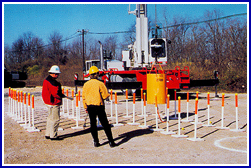 America
Crane Training's "CCO Prep Course" will
prepare the candidate in each of the four domains included
in the Core examination and the four specialty exams (as
outlined before). America
Crane Training's "CCO Prep Course" will
prepare the candidate in each of the four domains included
in the Core examination and the four specialty exams (as
outlined before).
We feel
that many operators may not have taken an exam in several
years and consequently may find the examination process
difficult; therefore we focus on our teaching through a
series of mini exams. The candidate will be given several
exams, the answers will then be discussed therein teaching
the candidate the content and enhancing his/her exam skills.
By the end of this training, the operator will have the
confidence and skills necessary to successfully complete
the National Commission for the Certification of Crane Operator's
examination.
Core
Examination
Domain
1: Site (Approximately 24% of the test)
Domain 2: Operations
(Approximately 23% of the test)
Domain 3: Technical Knowledge
(Approximately 28% of the test)
Domain 4: Manufacturer's
Load Charts (Approximately 25% of the test)
Specialty
Examinations
| |
Lattice
Boom Truck Cranes |
| |
Lattice
Boom Crawler Cranes |
| |
Small
Telescopic Boom Cranes (17.5 Tons) |
| |
Large
Telescopic Boom Cranes (>17.5 Tons) |
OFFSHORE
CRANE SAFETY
Length of Program 4 - 5 Days
 Offshore
cranes are essential to the operation of a platform; however,
operating the crane is one of the most accident prone activities
employees engage in on a regular basis. An offshore crane
is a complex and powerful machine that can be dangerous
if improperly operated or maintained. Many crane accidents
or failures are the result of operational errors. These
errors range from not checking control functions to overloading
the crane. Therefore, it is absolutely essential that an
operator knows the components of the crane, knows how the
crane operates, and is aware of the types of accidents that
can occur from a poorly operating machine or a careless
operation. Our course will teach your employees how to understand
load charts, and how to recognize and avoid unsafe operating
conditions. We accomplish this through teaching practical
and usable information, and through hands-on training. We
familiarize the operator with API, ASME Standards, OSHA
Regulations, and the manufacturer's requirements for crane
operations. After attending this class, the operator will
have the knowledge necessary to complete the OPERATOR CERTIFICATION
EXAM. Offshore
cranes are essential to the operation of a platform; however,
operating the crane is one of the most accident prone activities
employees engage in on a regular basis. An offshore crane
is a complex and powerful machine that can be dangerous
if improperly operated or maintained. Many crane accidents
or failures are the result of operational errors. These
errors range from not checking control functions to overloading
the crane. Therefore, it is absolutely essential that an
operator knows the components of the crane, knows how the
crane operates, and is aware of the types of accidents that
can occur from a poorly operating machine or a careless
operation. Our course will teach your employees how to understand
load charts, and how to recognize and avoid unsafe operating
conditions. We accomplish this through teaching practical
and usable information, and through hands-on training. We
familiarize the operator with API, ASME Standards, OSHA
Regulations, and the manufacturer's requirements for crane
operations. After attending this class, the operator will
have the knowledge necessary to complete the OPERATOR CERTIFICATION
EXAM.
Regulations
and Standards Referenced
API
Recommended Practice 2D
ASME B30.8 - Floating Cranes and Derricks
ASME B30.6 - Derricks
ASME B30.9 - Slings
OSHA 1917.45 - Cranes and Derricks
Topics
and Subject Matter Covered
| |
Causes
and Results of Crane Accidents |
| |
Types,
Components and Terminology |
| |
Operator
Qualifications |
| |
Operators
Responsibilities |
| |
Vessel
and Weather Considerations |
| |
Pre-Operational
Inspections |
| |
Making
a Lift Plan |
| |
Types
of Lifts Static/Dynamic |
| |
Utilizing
Crane's Full Potential |
| |
Structural
Ratings V. Stability |
| |
Understanding
and Using Load Charts |
| |
Safe
Operating Procedures |
| |
Hand
Signals and Responsibilities of Signal Person |
| |
Boom
Assembly & Disassembly |
| |
Securing
the Crane |
| |
Rigging
(Safe Procedures and Proper Inspection) |

[
back to top ]
Supervisors
Responsibilities [
back to top ]
1 Day Program
What those in charge need to know
This
program contains vital information for anyone in an authoritative
position. Supervisors will learn how to recognize potential
accidents, promote job-site safety and of responsibilities
as set forth by OSHA & ASME.
Regulations
and Standards Referenced
OSHA
1926.1400-1442 - Cranes and Derricks
OSHA 1910.180 - Crawler, Locomotive & Truck Cranes
ASME B30.5 - Mobile Cranes
Topics
and Subject Matter Covered
| |
Communication
Between Management and The Operator |
| |
Accident
Statistics and causes |
| |
Costs
of Accidents |
| |
Insuring
a Safe Workplace with Proper Safety Procedures |
| |
Understanding
the Latest Crane Technology |
| |
Current
OSHA and ASME Standards |
| |
Selecting
Safety Devices to Fit Your Needs |
| |
Hoisting
Personnel with a Crane |
| |
Why
Cranes Are So Dangerous |
| |
Keeping
Proper Crane Inspection Records |
| |
Designing
Out Electrical Hazards |
| |
Selecting
Proper Rigging |
| |
Rigging
Inspection Requirements |
| |
Lifting
Responsibilities |
Crane
Safety & Rigging [
back to top ]
4 Day Program or 2 Day Refresher
Beneficial for anyone working on or near the crane
Statistics
show that 83% of crane accidents involved operator error
which may have been due to lack of understanding of the
machine's capabilities. Our course will teach your employees
how to understand load charts, and how to recognize and
avoid unsafe operating conditions. We accomplish this through
teaching practical and usable information, and through hands-on
training. We familiarize the operator with OSHA, ASME, and
the manufacturer's requirements for crane operations. After
attending this class, the operator will have the knowledge
necessary to complete the OPERATOR CERTIFICATION EXAM.
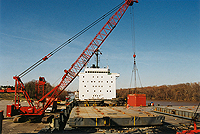
Regulations
and Standards Referenced
ASME
B30.5 - Mobile Cranes
OSHA 1926.1400-1442 - Cranes and Derricks
OSHA 1910.180 - Crawler, Locomotive and Truck Cranes
Power Crane Shovel Association Number 4
Topics
and Subject Matter Covered
| |
Causes
and Results of Crane Accidents |
| |
Types,
Components and Terminology |
| |
Choosing
the Correct Crane for the Job |
| |
Importance
of Proper Set-Up |
| |
Operators
Responsibilities Job Site Considerations |
| |
Pre-Operational
Inspections |
| |
Making
a Lift Plan |
| |
Utilizing
Crane's Full Potential |
| |
Structural
Ratings V. Stability |
| |
Powerline
Awareness |
| |
Understanding
and Using Load Charts |
| |
Safe
Operating Procedures |
| |
Hand
Signals and Responsibilities of Signal Person |
| |
Boom
Assembly & Disassembly |
This
course will help prepare the participant for the National
Commission for the Certification of Operators (CCO) exam.
Overhead
Crane Safety [
back to top ]
1-2 Day Program
Covering all types of Overhead Cranes
Overhead
cranes are found in great numbers and in a wide range of
applications, if improperly used or maintained they can
be extremely dangerous. Our program is composed of the practical
information and hands-on training. Your employees will learn
how to do the safest job possible.
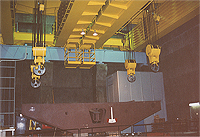
| Regulations
and Standards Referenced |

|
OSHA
1910.179 - Overhead & Gantry Cranes
ASME B30.2 - Overhead & Gantry Cranes
ASME B30.11 - Monorails & Underhung Cranes
ASME B30.16 - Overhead Hoists (Underhung)
ASME B30.17 - Overhead & Gantry Cranes
|
| |
|
| Topics
and Subject Matter Covered |

|
| |
Lifting
Responsibilities |
| |
Types
and Components |
| |
How
to Avoid Potential Accidents |
| |
Inspection
Procedures and Checklists |
| |
Pre
Operational Inspections |
| |
Adjustments
and Repairs |
| |
Preventative
Maintenance |
| |
Avoiding
Common Runway Problems |
| |
Attaching,
Handling & Moving the Load |
| |
Safe
Operating Procedures |
|
Inspecting
Mobile Cranes [
back to top ]
3 Day Program
Insure that your Inspectors are qualified
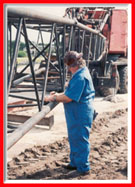 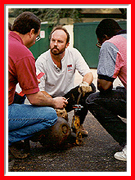 Learn
to inspect per ASME, OSHA, and PCSA requirements. Your employees
will learn the vital components of performing a thorough
inspection, which will enable you to perform in-house daily,
periodic, and annual inspections. Learn
to inspect per ASME, OSHA, and PCSA requirements. Your employees
will learn the vital components of performing a thorough
inspection, which will enable you to perform in-house daily,
periodic, and annual inspections.
Regulations
and Standards Referenced
USAS
B30.5 1968
ASME B30.5 Mobile Cranes
ASME B30.10 Hooks
OSHA 1926.1412-1416 and 1910.180
Power Crane Shovel Association #2 and #4
Topics
and Subject Matter Covered
| |
Mandatory
and Advisory Rules |
| |
Inspector
Responsibilities |
| |
Load
Test Requirements / Recommendations |
| |
Wire
Rope Inspection Criteria |
| |
Inspecting
Load Handling Devices |
| |
Hands-On
Field Inspection and Instructions |
| |
Developing
Inspection Forms to Meet Your Particular Needs (Pre-Op,
Quarterly, and Annual) |
| |
Boom
Inspection and Repair Procedures |
| |
Proper
Adjustments and Alignment for All Clearances |
| |
Nomenclature
for Internal Working Areas |
| |
Maintenance
Procedures and Requirements |
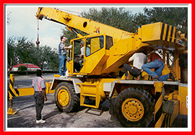
Safe
Rigging Procedures [
back to top ]
1 Day Program
The weakest link between the crane & load
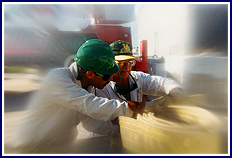 Improper
rigging has contributed to a large percentage of material
handling accidents. The participant will learn the capabilities
and limitations of different types of rigging hardware,
proper rigging procedures and rigging calculations. Improper
rigging has contributed to a large percentage of material
handling accidents. The participant will learn the capabilities
and limitations of different types of rigging hardware,
proper rigging procedures and rigging calculations.
Regulations
and Standards Referenced
OSHA
1910.184 - Slings
OSHA 1926.251 - Rigging for Equipment Handling
ASME B30.9 - Slings
ASME B30.10 - Hooks
ASME B30.20 - Below the Hook Lifting Devices
Topics
and Subject Matter Covered
| |
Inspection
Criteria for All Types of Rigging Hardware |
| |
Accident
Prevention |
| |
Federal
Regulations and Industry Standards |
| |
Lifting
Responsibilities |
| |
Lifting
Unknown Weights |
| |
How
to Estimate Weights Based on Tables |
| |
Determining
Load Center of Gravity |
| |
Types
of Hitches and How They Affect The Load |
| |
End
Fittings, Efficiency of Each Type |
| |
International
Hand Signals |
| |
Sling
Angle / Load Angle |
| |
Powerline
Considerations |
Backhoe
& Trenching Safety [
back to top ]
1 Day Program
Safe operating practices and excavations
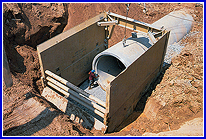
|
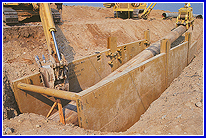
|
Backhoe
operations and trenching are among the most dangerous of
all construction operations. More workers are killed or
seriously injured in and around excavations than in most
other phases of construction work. Therefore, the regulations
and standards covering these areas have been revised and
clarified. This class has been designed to familiarize your
employees with the new guidelines, their responsibilities,
and hand to accomplish a safe job.
Regulations
and Standards Referenced
OSHA
1926.650 - Excavations
OSHA 1926.651 - Excavation Requirements
OSHA 1926.652 - Requirements for Protective Systems
Topics
and Subject Matter Covered
| |
General
Requirements of OSHA |
| |
Types
of Backhoes |
| |
Backhoe
Safety Rules |
| |
Backhoe
Pre-Operation Checklist |
| |
Performing
the Monthly Backhoe Inspection |
| |
Understanding
Soil Classifications |
| |
Performing
Soil Classification Testing |
| |
Competent
Person Responsibilities |
| |
Hazards
of Excavations |
| |
Excavation
Checklist |
| |
When
to use Shoring / Sloping |
| |
Keeping
a Daily Trenching Log |
| |
How
to Handle an OSHA Inspection |
| |
Completing
an OSHA Inspection Report Form |
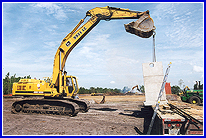
Inspecting
Overhead Cranes [
back to top ]
2 Day Program
Learn
to inspect per ASME, OSHA, and CMAA requirements. Your employees
will learn the vital components of performing a thorough
inspecion, which will enable you to perform in-house daily,
periodic, and annual inspections.
Regulations
and Standards Referenced
OSHA
1910.179 - Overhead & Gantry Cranes
ASME B30.2 - Overhead & Gantry Cranes
ASME B30.11 - Monorails & Underhung Cranes
ASME B30.16 - Overhead Hoists (Underhung)
ASME B30.17 - Overhead & Gantry Cranes
Topics
and Subject Matter Covered
 |
Mandatory
and Advisory Rules |
 |
Inspector's
Responsibilities |
 |
Inspection
Procedures and Checklists |
 |
Pre-Operational
Inspections |
 |
Wire Rope Inspection Criteria |
 |
Stages
of Inspections |
 |
Qualifications
of Inspectors |
 |
Load
Test Requirements/Recommendations |
 |
Adjustments
and Repairs |
 |
Preventative
Maintenance |
 |
Inspection
Documentation Procedures |
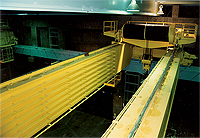
|

